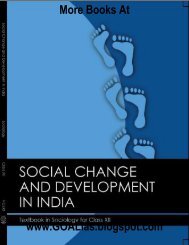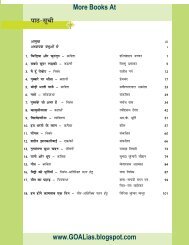t.com www.GOALias.blogspot.com www.GOALias.blogspot.com
t.com www.GOALias.blogspot.com www.GOALias.blogspot.com
t.com www.GOALias.blogspot.com www.GOALias.blogspot.com
- No tags were found...
Create successful ePaper yourself
Turn your PDF publications into a flip-book with our unique Google optimized e-Paper software.
<strong>www</strong>.<strong>GOALias</strong>.<strong>blogspot</strong>.<strong>com</strong>168 Politics in India since IndependenceRajiv Gandhi(1944-1991): PrimeMinister of Indiabetween 1984 and1989; son of IndiraGandhi; joined activepolitics after 1980;reached agreementswith militants inPunjab, Mizoram andthe students’ union inAssam; pressed for amore open economyand <strong>com</strong>putertechnology; sentIndian Armycontingent onthe requestof Sri Lankangovernment, to sortout the Simhala-Tamil conflict;assassinated bysuspected LTTEsuicide bomber.The second lesson is that the best way to respond to regionalaspirations is through democratic negotiations rather than militancy had erupted in Punjab; problems were persisting in theNorth-East; students in Assam were agitating; Kashmir valleywas on the boil. Instead of treating these as simple law and orderproblems, the Government of India reached negotiated settlementwith regional movements. This produced a reconciliation whichreduced the tensions existing in many regions. The example ofMizoram shows how political settlement can resolve the problemof separatism effectively.The third lesson is about the significance of power sharing. Itis not sufficient to have a formal democratic structure. Besidesthat, groups and parties from the region need to be given sharein power at the State level. Similarly, it is not sufficient to saythat the states or the regions have autonomy in their matters.The regions together form the nation. So, the regions must havea share in deciding the destiny of the nation. If regions are notgiven a share in the national level decision making, the feeling ofinjustice and alienation can spread.The fourth lesson is that regional imbalance in economicdevelopment contributes to the feeling of regional discrimination.Regional imbalance is a fact of India’s development experience.Naturally, the backward states or backward regions in somestates feel that their backwardness should be addressed onpriority basis and that the policies of the Indian government havecaused this imbalance. If some states remain poor and othersdevelop rapidly, it leads to regional imbalances and inter-regionalmigrations.Finally, these cases make us appreciate the farsightednessof the makers of our Constitution in dealing with questionsof diversity. The federal system adopted by India is a flexiblearrangement. While most of the states have equal powers, thereare special provisions for some states like J&K and the states inthe North-East. The Sixth Schedule of the Constitution allowsdifferent tribes <strong>com</strong>plete autonomy of preserving their practicesand customary laws. These provisions proved crucial in resolvingsome very <strong>com</strong>plex political problems in the North-East.What distinguishes India from many other countries that facesimilar challenges is that the constitutional framework in Indiais much more flexible and ac<strong>com</strong>modative. Therefore, regionalaspirations are not encouraged to espouse separatism. Thus,politics in India has succeeded in accepting regionalism as partand parcel of democratic politics.
















